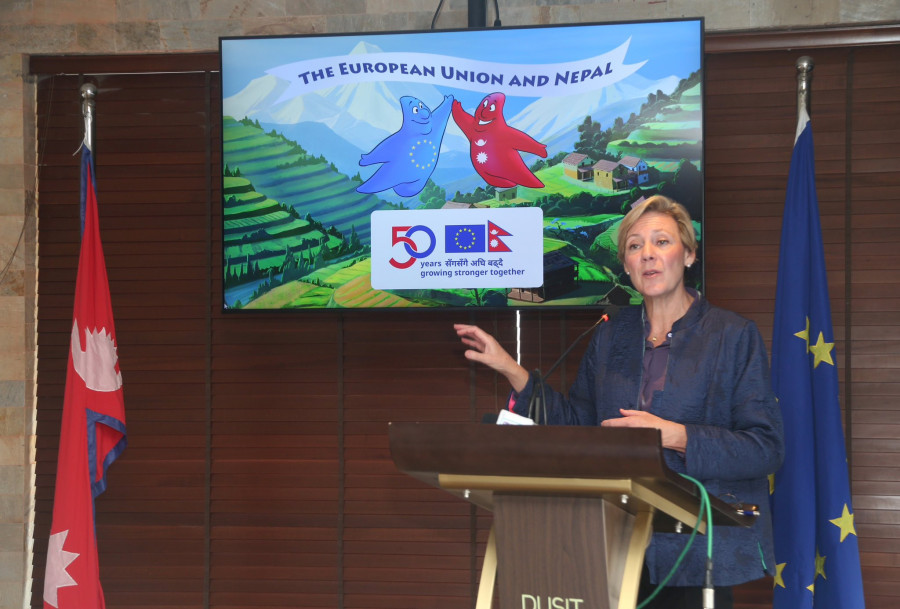National
Seven years is not a long time for federalism’s institutionalisation, EU envoy says
Presenting a strong defence of federalism, she said that Nepal’s constitution provides for political stability.
Post Report
At a time when some sections of Nepali society have expressed reservation over the federal set up in the country, Ambassador of the Delegation of European Union in Nepal Veronique Lorenzo has said six-seven years is not a long time for the institutionalisation of federalism.
“It took several years for the federal set up to get institutionalised in Europe, America and other countries,” she said during a press conference held in Kathmandu on Thursday to mark the 50th year of diplomatic relations between Nepal and the European Union.
She also assured that the EU will continue to support Nepal in strengthening local governance and federalism, promoting inclusive green growth, and speeding up human capital development.
“The EU will work with Nepal in the coming days on the implementation of federalism and boosting the performance of the local levels to strengthen democracy and governance in the country,” Lorenzo said.
When asked about protests of late by pro-monarchy and anti-federal segments inside Nepal, Lorenzo said that the European Delegation strongly supports the intricacies of Nepal’s constitution. “Political polarisation has become a new trend in several parts of the world fueled by misinformation, disinformation and fake news,” she said.
The constitution of Nepal is just seven years old and the only way to tackle these phenomena is to ensure effective delivery, she said, adding that federalism is also making some remarkable progress but there are some misconceptions too.
“Democracy and freedom are under attack and we have to fight every day to save them,” she said.
“From peace process to girl education to job creation, we will continue as partners for peace and prosperity in Nepal,” Lorenzo continued. “Our support to the education sector has yielded a very positive result. The EU would help Nepal transition to a greener economy to tackle climate change and create jobs and business opportunities.”
Presenting a strong defence of federalism, she said that Nepal’s constitution has provided political stability.
She further pledged to continue the EU’s support to Nepal in areas like job creation so that it can control “catastrophic levels of migration.”
“Yes, migration is good for poverty alleviation and remittance but it also has a tremendous effect,” she said. “It has a cost in the future.”
The EU is also keen to support Nepal in sectors like renewable energy, producing skilled manpower, enabling an environment for foreign direct investment and trying to reach out to the youths of this country who are the future of this country, Lorenzo said, adding that EU is also facilitating a business summit in Kathmandu soon where some of the most pressing economic and investment related issues like fin-tech, agriculture, high-end tourism, and ‘green development;, among other issues, will be discussed.
The European Union and Nepal established political and economic relations in 1974 and signed a Cooperation Agreement on 1 June 1996. Both partners have undergone important changes over the past 50 years. Nepal has become a federal republic, while the European Economic Community became the European Union in 1993 and developed its common foreign and security policy in 2010 with the creation of the European External Action Service (EEAS).
“Today, the EU and Nepal share the commitment to protect and promote a rule-based international order, peace and prosperity, human rights and democracy,” said a statement.
“This year we celebrate 50 years of steadfast partnership, which grows stronger every year with our unwavering commitments to work together for peace and prosperity,” Ambassador Lorenzo said.
“As Nepal advances towards graduating from LDC status by 2026, the EU and its Member States, our Team Europe, will continue to support Nepal in three areas key for its development: inclusive green growth; human capital development; and good governance. As we move forward, the EU Global Gateway, our new comprehensive approach to investing in development, will support renewable energy, where Nepal has a massive potential.”
The Office of the European Delegation is organising a series of programmes to celebrate the 50 years of the establishment of diplomatic relations between Nepal and the EU.
Meanwhile, on removing Nepali airlines from the EU’s negative air safety list, Lorenzo did not offer any concrete date as to when Nepali airlines will get the exemption. She, however, said that the Nepali side has made some progress towards that. “It might take years but there is some good progress,” she said.




 8.67°C Kathmandu
8.67°C Kathmandu














